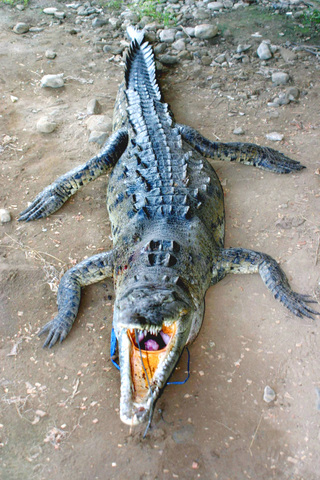Have you ever seen a crocodile? Crocodiles spend much of their time hiding under water with just their eyes showing above the water. This helps them to surprise their prey.
A long time ago people who saw crocodiles eating their prey saw something very strange. The crocodile cried while eating its prey! Tears would fall from its eyes as it ate an animal or sometimes even a person.
Of course people didn't believe that a crocodile could really be sad about killing and eating its prey. So if someone's tears seem to be just for show— if you don't believe they are really sad or sorry — in English you can say they are crying crocodile tears.

PHOTO: EPA
Now zoologists have found that crocodiles cannot swallow their prey under water or they will drown. So they have to eat their prey on land. When they have been out of the water for a few minutes their eyes become dry. So the "tears" are just the way that a crocodile looks after its eyes.
(Catherine Thomas, Staff Writer)
你看過鱷魚嗎?鱷魚時常躲在水裡,水面上只看得到眼睛,這也有助於牠們突擊獵物。
很久以前,當人們看見鱷魚吃獵物時,發現了相當奇怪的事。鱷魚吃獵物時會哭泣!鱷魚吃動物、甚至吃人時,眼淚會從牠們眼裡掉下來。
當然,人們可不相信鱷魚真的是因捕食獵物而難過。所以,假使某人的眼淚似乎只是為了表演,而你不相信他們是真心難過或抱歉,在英文中,你就可以說他們是「cry crocodile tears」。
現今,動物學家已發現,鱷魚在水中不能吞食獵物。所以,牠們必須在陸地食用獵物。牠們離開水中幾分鐘,眼睛就會變得乾澀。因此,「流淚」不過是鱷魚調適眼睛的方式。
(翻譯:賴美君)

A: Wow, Les Miserables Staged Concert Spectacular is visiting Taiwan for the first time. B: Isn’t Les Miserables often praised as one of the world’s four greatest musicals? A: Yup. Its concert is touring Taipei from tonight to July 6, and Kaohsiung between July 10 and 27. B: The English version of the French musical, based on writer Victor Hugo’s masterpiece, has been a huge success throughout the four decades since its debut in 1985. A: The musical has never toured Taiwan, but going to the concert sounds like fun, too. A: 哇,音樂劇《悲慘世界》紀念版音樂會首度來台巡演! B: 《悲慘世界》……它不是常被譽為全球四大名劇之一嗎? A: 對啊音樂會將從今晚到7月6日在台北演出,從7月10日到27日在高雄演出。 B: 這部法文音樂劇的英文版,改編自維克多雨果的同名小說,自1985年首演以來,在過去40年造成轟動。 A:

Some 400 kilometers above the Earth’s surface, the “International Space Station” (ISS) operates as both a home and office for astronauts living and working in space. Astronauts typically stay aboard the station for up to six months and engage in groundbreaking research projects in various fields, such as biology, physics and astronomy. These projects help scientists understand life in space and contribute to advancements that benefit people on Earth. The ISS has experienced significant growth since construction began in 1998. The station’s design and assembly represent an extraordinary international collaboration among Canada, the European Union, Japan, Russia and the United States.

A: While hit musical Les Miserables’ concert tour kicks off, South Korean drama Squid Game 3 will be back at the end of this month. B: New Taiwanese dramas The World Between Us 2 and Zero Day Attack have also gained attention. A: I heard that Zero Day Attack is a story about the Chinese Communist Party’s People’s Liberation Army trying to attack Taiwan by force. B: The drama’s subject is so sensitive that it has sparked a lot of controversy in society. A: I just hope that such a horrible story will never happen in

Continued from yesterday(延續自昨日) https://www.taipeitimes.com/News/lang Living on the ISS is challenging due to the absence of gravity. Astronauts must strap themselves into sleeping bags to prevent floating away while they sleep. They also spend about two hours exercising daily using specialized equipment. Despite this, microgravity can cause muscle loss, bone density reduction and cardiovascular changes. As a result, astronauts require extensive rehabilitation upon their return to Earth. In spite of these difficulties, astronauts often describe their experience on the ISS as life-changing. One of the most awe-inspiring aspects of living aboard the space station is the unparalleled view of Earth. Traveling at